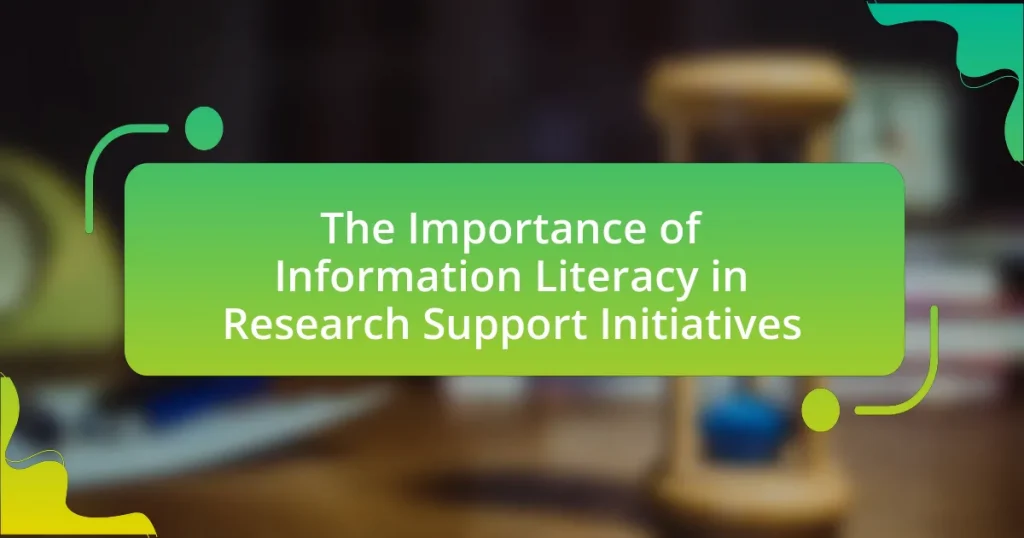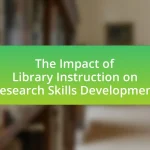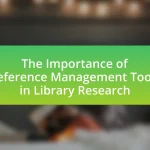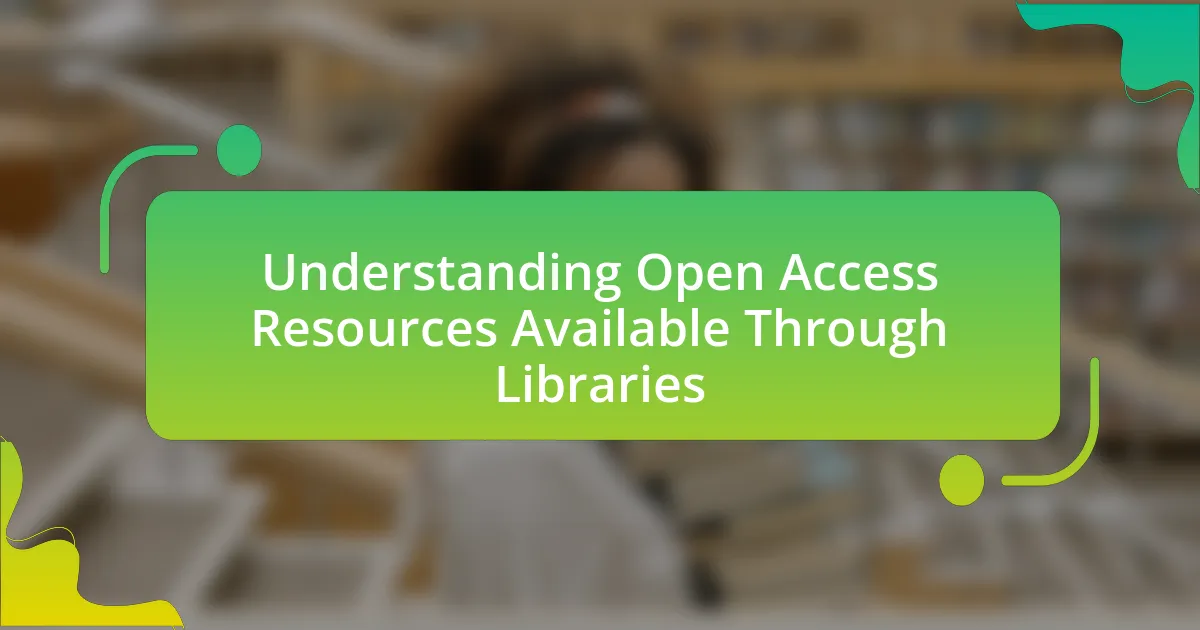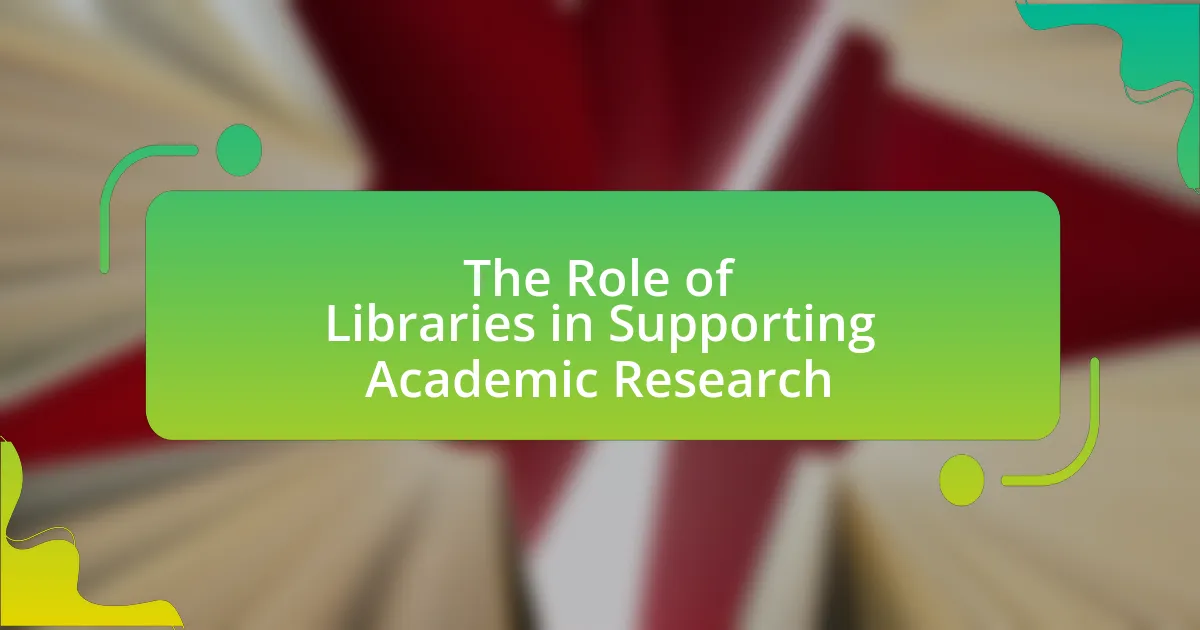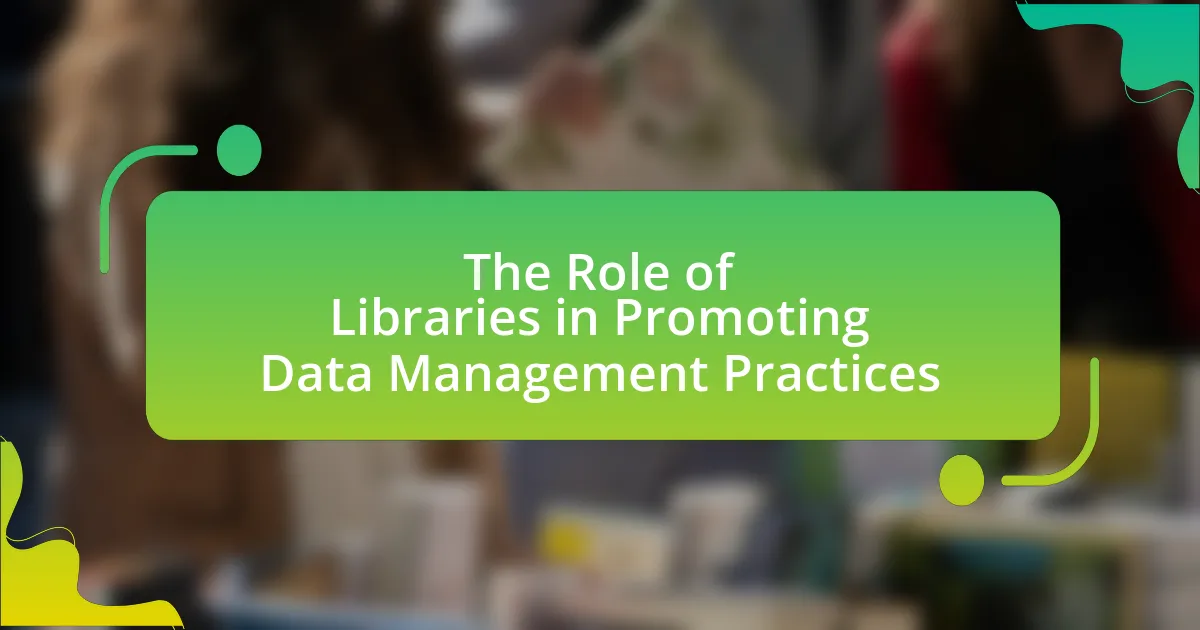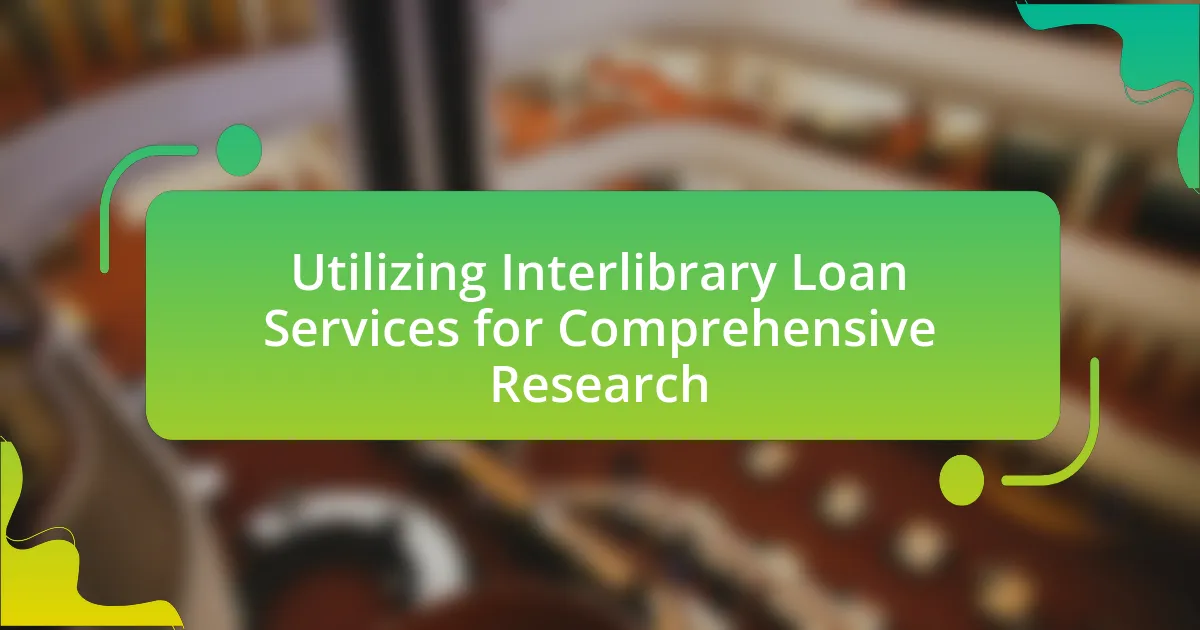The main entity of the article is information literacy and its significance in research support initiatives. The article emphasizes that information literacy is essential for researchers as it enables them to effectively locate, evaluate, and utilize information, thereby enhancing the quality and credibility of their research outcomes. Key components of information literacy include critical thinking, ethical use of information, and the ability to synthesize diverse sources. The article also discusses the challenges researchers face without information literacy, the impact of misinformation, and strategies for promoting information literacy through training programs and collaboration between institutions. Additionally, it highlights the role of libraries in fostering these skills and provides resources for developing information literacy competencies.
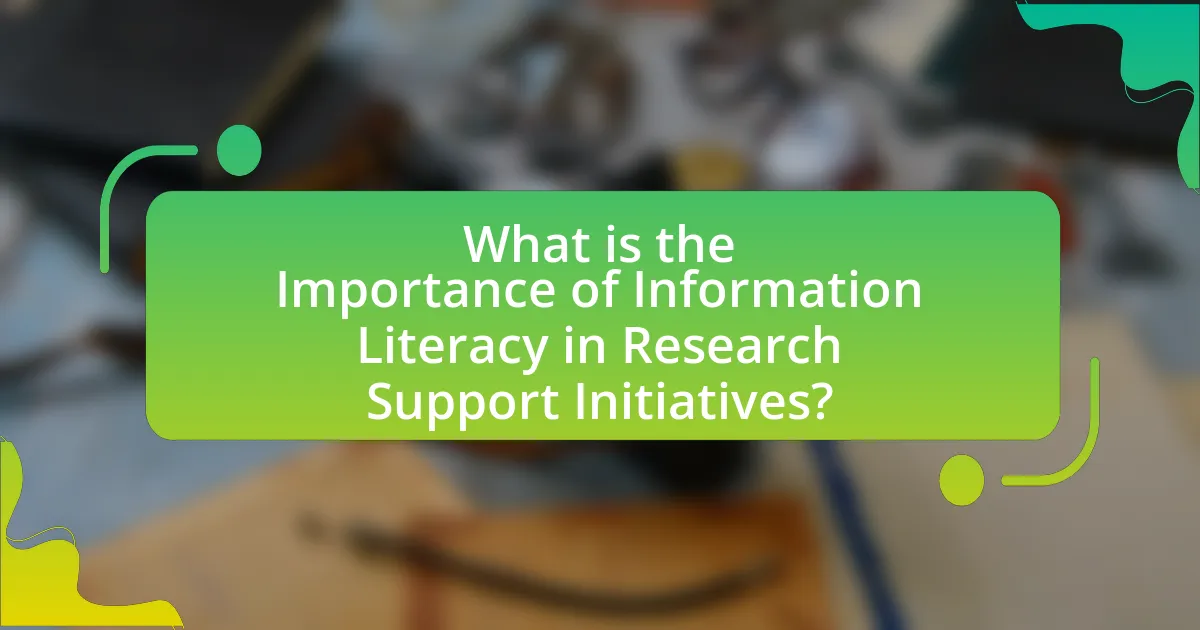
What is the Importance of Information Literacy in Research Support Initiatives?
Information literacy is crucial in research support initiatives as it empowers individuals to effectively locate, evaluate, and utilize information. This competency enhances the quality of research by enabling researchers to discern credible sources from unreliable ones, thereby improving the integrity of their findings. According to a study published in the Journal of Academic Librarianship, researchers with strong information literacy skills are more likely to produce high-quality publications and secure funding, as they can navigate complex information landscapes efficiently. Thus, information literacy directly contributes to the success and credibility of research initiatives.
How does information literacy enhance research support initiatives?
Information literacy enhances research support initiatives by equipping researchers with the skills to effectively locate, evaluate, and utilize information. This competency leads to more efficient research processes, as individuals can discern credible sources from unreliable ones, thereby improving the quality of their work. For instance, a study by the Association of College and Research Libraries found that information literacy instruction significantly increased students’ ability to conduct research, resulting in higher academic performance. By fostering critical thinking and analytical skills, information literacy ultimately supports more robust and impactful research outcomes.
What are the key components of information literacy in research?
The key components of information literacy in research include the ability to identify, locate, evaluate, and effectively use information. These components enable researchers to discern credible sources, understand the context of information, and apply it appropriately to their work. For instance, a study by the Association of College and Research Libraries (ACRL) outlines that information literacy encompasses skills such as critical thinking, ethical use of information, and the ability to synthesize diverse sources. This framework is essential for ensuring that research is grounded in reliable data and contributes meaningfully to academic discourse.
How does information literacy impact the quality of research outcomes?
Information literacy significantly enhances the quality of research outcomes by equipping researchers with the skills to effectively locate, evaluate, and utilize information. This competency leads to more accurate data interpretation and informed decision-making, which are critical for producing reliable research findings. Studies indicate that researchers with strong information literacy skills are more likely to produce high-quality publications, as they can discern credible sources from unreliable ones, thereby reducing the risk of misinformation. For instance, a study published in the Journal of Information Science found that researchers who received training in information literacy demonstrated a 30% improvement in the quality of their literature reviews, which are foundational to robust research outcomes.
Why is information literacy essential for researchers?
Information literacy is essential for researchers because it enables them to effectively locate, evaluate, and use information relevant to their studies. This skill set is crucial in a landscape flooded with data, where distinguishing credible sources from unreliable ones is vital for producing valid research outcomes. According to a study published in the Journal of Information Science, researchers with strong information literacy skills are more likely to produce high-quality publications and secure funding, as they can critically assess the literature and identify gaps in knowledge. Thus, information literacy directly impacts the quality and credibility of research.
What skills are developed through information literacy?
Information literacy develops critical thinking, research skills, and effective communication. Critical thinking enables individuals to evaluate information sources for credibility and relevance, which is essential in distinguishing between reliable and unreliable data. Research skills involve the ability to locate, organize, and synthesize information from various sources, enhancing one’s capacity to gather evidence and support arguments. Effective communication skills are honed as individuals learn to articulate their findings clearly and persuasively, whether in writing or verbally. These skills are vital in academic and professional settings, as they empower individuals to navigate the vast information landscape efficiently and responsibly.
How does information literacy contribute to ethical research practices?
Information literacy contributes to ethical research practices by equipping researchers with the skills to critically evaluate sources, ensuring the integrity and credibility of their work. This skill set enables researchers to discern reliable information from misinformation, which is crucial for maintaining ethical standards in research. For instance, a study published in the Journal of Information Ethics highlights that researchers who possess strong information literacy skills are less likely to engage in plagiarism and are more adept at properly citing sources, thereby upholding academic integrity.
What challenges do researchers face without information literacy?
Researchers face significant challenges without information literacy, including difficulties in identifying credible sources, evaluating the quality of information, and effectively synthesizing data. Without the ability to discern reliable information, researchers may rely on inaccurate or biased sources, leading to flawed conclusions. A study by the Association of College and Research Libraries found that 73% of students struggle to evaluate the credibility of online information, highlighting the pervasive issue of misinformation. Additionally, researchers lacking information literacy skills may waste time on irrelevant data, ultimately hindering their productivity and the quality of their work.
How does a lack of information literacy affect research efficiency?
A lack of information literacy significantly reduces research efficiency by hindering the ability to locate, evaluate, and utilize relevant information effectively. Researchers without strong information literacy skills may struggle to identify credible sources, leading to the use of unreliable data, which can compromise the quality of their findings. According to a study published in the Journal of Information Literacy, researchers with higher information literacy skills are 50% more likely to produce high-quality research outputs compared to those with lower skills. This demonstrates that inadequate information literacy not only prolongs the research process but also diminishes the overall impact of the research conducted.
What are the consequences of misinformation in research?
Misinformation in research leads to significant consequences, including the propagation of false conclusions and the erosion of public trust in scientific findings. When researchers rely on inaccurate data or flawed methodologies, the validity of their results is compromised, which can misguide future studies and policy decisions. For instance, a study published in the journal “Nature” highlighted that misinformation can result in the misallocation of resources, as seen in public health responses during the COVID-19 pandemic, where incorrect information about transmission and prevention strategies led to ineffective measures. This illustrates how misinformation not only affects individual research outcomes but also has broader implications for societal health and safety.
How can research support initiatives promote information literacy?
Research support initiatives can promote information literacy by providing structured resources and training that enhance individuals’ ability to locate, evaluate, and use information effectively. These initiatives often include workshops, online tutorials, and access to databases that teach critical thinking and research skills. For example, a study by the Association of College and Research Libraries found that institutions implementing targeted information literacy programs saw a 30% increase in students’ ability to assess the credibility of sources. This evidence demonstrates that well-designed research support initiatives can significantly improve information literacy among users.
What strategies can be implemented to improve information literacy?
To improve information literacy, educational institutions can implement targeted training programs that focus on critical thinking, evaluation of sources, and effective research strategies. These programs should include hands-on workshops that teach students how to discern credible information from unreliable sources, utilizing tools such as the CRAAP test (Currency, Relevance, Authority, Accuracy, Purpose) to assess the quality of information. Research indicates that students who participate in structured information literacy instruction demonstrate significantly higher skills in evaluating sources and conducting research effectively, as shown in a study by the Association of College and Research Libraries, which found that 80% of students improved their information evaluation skills after such training.
How can training programs be designed to enhance information literacy?
Training programs can be designed to enhance information literacy by incorporating active learning strategies, tailored content, and assessment methods that align with learners’ needs. Active learning strategies, such as hands-on workshops and collaborative projects, engage participants and promote critical thinking skills essential for evaluating information sources. Tailored content ensures that the training addresses specific information literacy challenges faced by different user groups, such as students, researchers, or professionals. Assessment methods, including pre- and post-training evaluations, measure improvements in information literacy skills, providing concrete evidence of the program’s effectiveness. Research indicates that programs utilizing these approaches significantly improve participants’ ability to locate, evaluate, and use information effectively, thereby enhancing overall information literacy.
What role do libraries play in fostering information literacy?
Libraries play a crucial role in fostering information literacy by providing access to resources, instruction, and support for users to effectively find, evaluate, and use information. They offer workshops, tutorials, and one-on-one assistance that teach essential skills such as critical thinking, research methodologies, and digital literacy. According to the American Library Association, libraries are instrumental in promoting lifelong learning and empowering individuals to navigate the complex information landscape, which is vital in today’s digital age. This support not only enhances academic success but also prepares individuals for informed citizenship and professional development.
What are the best practices for integrating information literacy into research support?
The best practices for integrating information literacy into research support include embedding information literacy instruction within the research process, collaborating with faculty to design curriculum that emphasizes critical evaluation of sources, and providing tailored workshops that address specific research needs. Research shows that when librarians partner with academic departments, they can enhance students’ ability to locate, evaluate, and use information effectively, leading to improved research outcomes. For instance, a study by the Association of College and Research Libraries found that students who received information literacy training demonstrated higher levels of research competency and confidence.
How can collaboration between institutions enhance information literacy efforts?
Collaboration between institutions can enhance information literacy efforts by pooling resources, expertise, and best practices to create comprehensive educational programs. When institutions work together, they can develop standardized curricula that address diverse information literacy needs, ensuring consistency and quality across different educational settings. For instance, a study by the Association of College and Research Libraries found that collaborative initiatives led to improved student outcomes in information literacy skills, as shared resources allowed for more effective teaching methods and materials. This synergy not only maximizes the impact of information literacy training but also fosters a culture of continuous improvement and innovation in educational practices.
What resources are available for developing information literacy skills?
Resources available for developing information literacy skills include online courses, library workshops, and educational websites. Online platforms such as Coursera and edX offer courses specifically focused on information literacy, often created by universities and educational institutions. Library workshops, frequently organized by academic libraries, provide hands-on training in research methods, citation practices, and evaluating sources. Additionally, websites like the Association of College and Research Libraries (ACRL) provide guidelines and frameworks for information literacy, which serve as valuable resources for both educators and learners. These resources collectively enhance the ability to locate, evaluate, and use information effectively, which is essential in research support initiatives.
How can researchers assess their information literacy skills?
Researchers can assess their information literacy skills by utilizing self-assessment tools, participating in workshops, and engaging in peer evaluations. Self-assessment tools, such as the Information Literacy Competency Standards for Higher Education, provide a framework for researchers to evaluate their abilities in identifying, locating, and effectively using information. Workshops often offer practical exercises that enhance skills and provide feedback on performance. Peer evaluations allow researchers to receive constructive criticism from colleagues, further identifying strengths and areas for improvement. These methods collectively enable researchers to gain a comprehensive understanding of their information literacy competencies.
